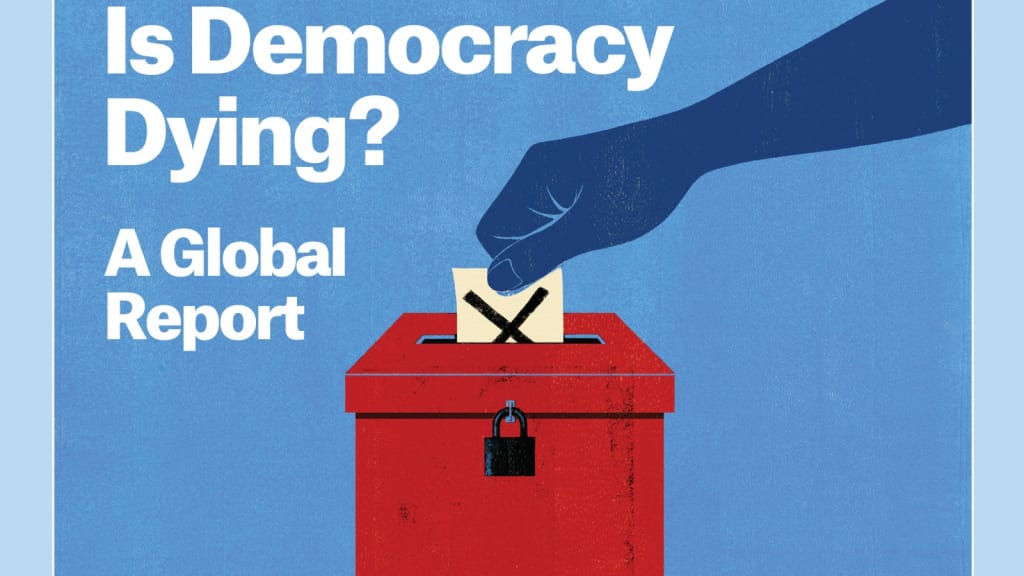A Democratic War
A History of Fair Violence

Democracy started a couple millennium ago, back in 500 B.C. in the ancient Greek city of Athens, created by an Athenian named Cleisthenes. All men, whether rich or poor, were allowed to vote by the Government. Great for men, a problem for women, who were shut out of the political power that they had during the Archaic period.
This caused greater tension between two parties, caused by sexism, caused by this new invention: democracy. The first of the transgressions that it would soon come to cause.However, democracy worked and soon was adopted by many other city-states. But most of them allowed even fewer people to vote than Athens did; most of the other city-states only allowed free, adult, male citizens to vote IF they owned land or owned their own house. Women still didn't vote. The problem persists. Soon the Holy Roman Empire wiped the democratic movement out, around 100 B.C.
It was millennia later when the Italian government, in the Middle Ages, re-adopted democracy after the death of Matilda of Canossa. The democracies implemented were all organized differently, but none of them allowed the poor, women, or children to vote. These too were eventually conquered by the Holy Roman Empire and ruled by German emperors.
In the 1600s, Europeans saw more of these American and African people. They didn’t have to do what the king said. Soon Europeans started to fight for democracy again. In England, Cromwell seized power for Parliament. Thomas Paine and Mary Wollstonecraft wrote about human rights. In America, the Revolutionary War brought the Constitution in 1789, which let free adult men vote if they owned their own farm or business. A few years later, the French Revolution brought democracy to France (for a short time).
These early modern democracies only let rich men vote—not women, or children, or enslaved people, or colonized people. But slowly, more people started to fight for their right to vote and hold office. In the early 1800s, poor white men got the vote. Then slowly in the later 1800s, enslaved people broke free in the United States and Brazil. In Austria-Hungary and Russia, the serfs won their freedom too. By the early 1900s, women were getting the right to vote. In 1964, the Civil Rights Act pushed the United States forward. And in 1971, 18-year-olds got the right to vote in the United States.
Today, many countries are democracies, and in most of them, poor people, people of color, and women have now won the right to vote, though children and foreigners still can’t. Some places are experimenting with letting 16-year-old people vote. The amount of power available to voters, however, still varies widely from country to country, and many countries, like Saudi Arabia, are still not democratic at all.
Now we have a brief history of democracy. Let's further address modern democracy. Through indoctrination of political wings in schools, social groups, families or even religious venues, people have taken sides and have formed greater factions that have unintentionally created further divisions. We have the alt-right, alt-left, centralists, soft-right, soft-left, plus many more, even more radical divisions among wings. Yet all are created by the idea of democracy. That people have the right to vote for their ideas to be in parliament. Yet, like any side, there is an opposition that provides another idea that not everyone will agree on, yet may still vote all the same and may even win.
In extreme cases, like the recent years caused by tensions between Liberals, Conservatives, Republicans, and Communists, people have taken to greater violence and protests, which was originally bred from the idea of democracy, but people ultimately not understanding that there is always a chance when voting that the other side may win. Those that throw down their toys in tantrum begin to oppose the idea of democracy whether they are aware of it or not. The game was simple, the rules were set and the outcome was final. But alas, some do not like the outcome and tip the table and flip the board game.
This is one major problem of democracy: overall creating divisions, segregation and even alienation, soon breeding an internal war between these factions where the loser calls it unfair and wrong, despite the system being based on votes of the people.
The second is how easily manipulated the process of voting via democracy can be by corrupted government bodies. Voting can be rigged in favour of a party. In some cases, even if there has been no corruption or rigging, the opposition can proclaim that the other party had indeed rigged the votes! That they were cheating! Throwing another tantrum when losing... causing further conflict.The second major problem of democracy, being easily manipulated, can easily be a scapegoat for losers, and can be riddled with corruption.
It has been subject to many forms of discrimination: racism, sexism, anti-antisemitism, anti-islamic, classism. Ever since Athens, people have been denied the right to vote, and this has bred violence through protests and rioting that lead to change but also lead to us being spoiled when we don't get what we want.
Humanity, I believe, was meant to be controlled, contained. We can't look after ourselves, yet there is no one out there capable of looking after us and making sure we don't create civil wars after civil wars.
Despite being a great idea that boasts the freedom of humanity, democracy definitely has its problems, and has thus far been the downfall of this decade.






Comments
There are no comments for this story
Be the first to respond and start the conversation.